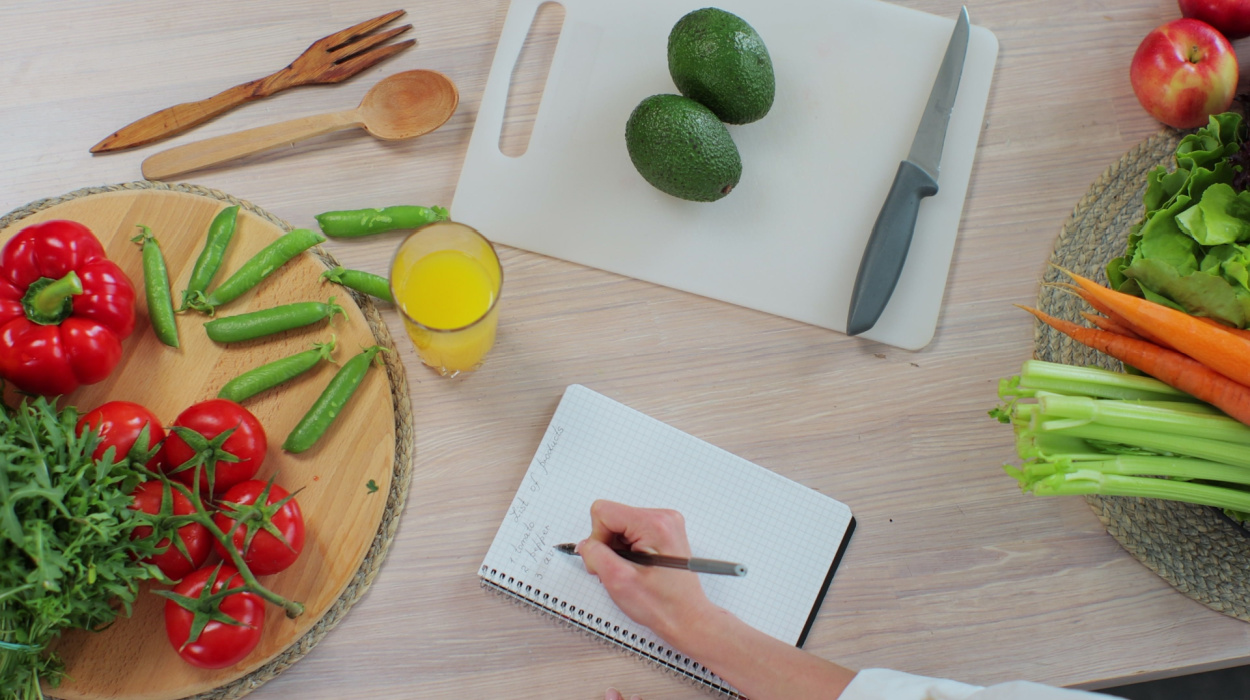A weight loss journey can be both exciting and challenging. There are many factors at play in planning healthy meals. We will focus on diet and positive dietary habits.
Building a well-rounded grocery list is the key to your success in weight loss. If you’re on a mission to burn fat in your belly, thighs, or back, your journey starts right in the supermarket aisle. By stocking your pantry and fridge with the right foods, you’ll set yourself up for success on your weight loss journey.
Do you know what foods you need? For example, are bananas good for weight loss? Every item on the shelf has a role to play.
Here, we will guide you through creating a grocery list for weight loss. We’ll explore essential staples and the best superfoods to boost your sustainable weight loss efforts.
Healthy Grocery List For Weight Loss
Crafting a grocery list for weight loss involves focusing on nutritious, low-calorie foods. Here’s a list that can help you create balanced meals while supporting your weight loss goals:
- Fresh or frozen fruits without added sugar.
- Vegetables.
- Proteins ( i.e., lean meat, fish, and eggs).
- Whole grains.
- Legumes.
- Healthy fats.
- Low-fat dairy options.
- Other essentials.
Grocery List For Weight Loss
When it comes to weight loss, a well-balanced diet is key. It’s not about depriving yourself of following fad diets but, rather, about nourishing your body with various nutrients. So, you want to aim to include all the essential macronutrients – carbohydrates, proteins, fats, and a variety of micronutrients.
At the same time, being mindful of your calorie intake is crucial. The goal of these well-balanced diets is not just to focus on nutritional profiles but to create a calorie deficit by consuming fewer calories than you burn through activity.
This translates to your body burning fat, and you lose weight overall. However, these nutrient-dense foods will provide you with the necessary nutrients to lose fat and gain muscle. The only thing to remember is that even healthy foods can contribute to weight gain if consumed excessively.
Without further ado, here are some nutritious foods you should add to your healthy grocery list for weight loss:
Fruits

Your first stop at the grocery store should be the fruit aisle. Fruits are instrumental to weight loss because they are low in calories and very nutritious. Fresh and frozen fruits (without added sugar) are also fiber-rich to keep you full[1] and promote weight loss. Also, they are very versatile.
Vibrant berries, citrus fruits, and tropical treats satisfy your sweet tooth and offer an array of health benefits. Rich in antioxidants, vitamins, and minerals, these fruits support your overall well-being while providing a natural sweetness to your meals and snacks without added sugars.
Also, eating fruit is linked to a lower body weight and a lower risk of diabetes,[2] high blood pressure, cancer, and heart disease.[3] Here are a few weight loss-targeted fruits you should put on your list:
- Apples.
- Mixed berries: Strawberries, blueberries.
- Bananas.
- Grapefruit.
- Frozen fruit sweetened without added sugar.
Vegetables
Vegetables are paramount for health, and they have numerous weight loss benefits as well.[4] Non-starchy vegetables have low amounts of carbohydrates and calories and are rich in fiber, vitamins, minerals, and antioxidants. Some starchy vegetables,[5] like potatoes, now count towards the bread/cereal group servings.
Vegetables can help you lose weight[6] by managing blood sugar levels, lowering blood lipids, as well as helping prevent chronic diseases. Some examples include leafy greens like spinach, kale, and Swiss chard.
Packed with vitamins, minerals, and antioxidants, leafy greens add a burst of freshness to salads, smoothies, and sautés.
Proteins
If you want to lose weight, lean proteins are your best friend. They provide essential nutrients and help you feel full and satisfied.
But what should you be looking for when selecting proteins? Are eggs good enough? Or are there better options?
Skinless poultry, such as the white meat of chicken and turkey, are excellent sources of lean protein. They are low in fat and calories and help to maintain muscle mass, making them ideal for weight loss.[7] For meat, opt for lean cuts like sirloin, tenderloin, and lean ground beef.
Also, fish and seafood are delicious and packed with protein and essential omega-3 fatty acids. Salmon, tuna, trout, and shrimp are great choices for weight loss. They provide nutrients that support heart health[8] and boost your metabolism.[9]
Whole Grains
Carbohydrates get a bad reputation in the weight loss world, but not all carbs are created equal. Choosing smart carbohydrate options that provide energy, fiber, and essential nutrients without sabotaging your weight loss efforts is important.
Whole grains, such as brown rice, quinoa, and whole-grain bread, are excellent additions to your weight loss grocery list. Not only are they packed with fiber, which helps keep you feeling full, but they also provide essential vitamins and minerals. Using portion control, however, is key to managing carbohydrates like starchy vegetables and brown rice.
Consuming whole grains instead of refined grains can improve glucose homeostasis[10] and normalize blood glucose concentrations. This leads to a lower risk of metabolic conditions like diabetes. They also help with improving your gut health.[11] All in all, they have a great relationship with weight loss.[12]
Avoid processed foods and sugary foods with added high fructose corn syrup.
Legumes

If you are vegan, then you need a vegan grocery list for weight loss. Legumes and beans are a great source of plant-based protein and provide an excellent dose of carbohydrates. Add options like kidney beans, black beans, lentils, and chickpeas to your grocery list to boost your weight loss journey.
Tofu, tempeh, and edamame are also excellent sources of plant-based protein. A study found that eating a plant-based diet rich in legumes can help you lose weight,[13] shift body composition to reduce body fat, and lower insulin sensitivity in overweight adults.
Healthy Fats
Contrary to popular belief, fats and oils are essential for a balanced diet and weight loss.[14] However, it’s important to make smart choices to avoid weight gain. Despite being calorie-dense, healthy fats can contribute to weight loss.[15]
Including the right fats in meals can help you feel fuller for longer and aid weight management. Look for foods high in monounsaturated fatty acids[16] that are healthy, such as those in extra virgin olive oil and nut butter.
Nuts and seeds are also great sources of healthy fats, essential vitamins, and minerals. Almonds, walnuts, chia seeds,[17] and flaxseeds are excellent choices. Natural nut butter, such as almond butter or peanut butter, is a tasty and nutritious addition to your weight loss journey. Natural nut butter has the oil floating at the top and is not solid at room temperature like those with hydrogenated fat added to them as stabilizers.
Another example is avocados. They are a beloved fruit, and for good reason. They are packed with heart-healthy monounsaturated fats.[18] They also provide a creamy texture to meals. Other healthy fat sources include fatty fish like salmon or anchovies.
Low-Fat Dairy Options
Another great item on your grocery list is milk. We have it on all our lists. But the type of milk you need differs when you want to lose weight.
Creating a grocery list tailored for weight loss often involves selecting nutrient-dense, low-calorie foods.
A staple in many households is low-fat or skim milk. Packed with calcium and protein, these options offer a creamy taste with significantly reduced fat content. They serve as excellent bases for smoothies and cereals or are simply enjoyed alone.
Greek yogurt, particularly the low-fat variety, is another fantastic option compared to plain yogurt. It’s rich in probiotics, protein, and calcium, making it a satisfying snack or a versatile ingredient in recipes, from dressings to baking. Or, opt for fortified dairy alternatives like almond milk, which is low in calories and fat, and is rich in calcium and vitamin D.
However, it is essential to check labels while shopping to ensure you’re selecting products with lower fat content. Products labeled low-fat may compensate by adding extra sugars or other additives, so being mindful of the overall nutritional profile is crucial.
Other Essentials
If you are shopping with a grocery list for weight loss on a budget, there are some other essentials you just cannot miss out on.
One is water. It is an absolute must-have. It’s essential for hydration and can aid in weight loss[19] by helping curb hunger and supporting your body’s metabolic processes. Choosing water over sugary drinks or sodas also improves overall health.
Other supporting weight loss tools are protein powder and diet pills. Protein powder[20] can be a beneficial addition, especially if you struggle to meet your protein needs through whole foods alone. Diet pills and fat burners can also supplement your diet with extra nutrients and often stimulants that boost your weight loss journey.
Lastly, are healthy snacks. When it comes to healthy snacks, investing in bulk purchases of nuts, seeds, or air-popped popcorn can be a cost-effective way to have nutritious snacks on hand. They give you something to munch on during the day and also supplement weight loss.
Shopping Tips For Weight Loss
Aside from having a meal planner for weight loss and a grocery list, mindful shopping plays a vital role in supporting weight loss efforts. Here are some tips to consider while grocery shopping:
- Plan: Create a detailed grocery list based on meal plans and healthy snacks to avoid impulse buys.
- Healthy choices: Shop the perimeter for fresh produce, lean meats, and whole foods; Read labels for nutrition information.
- Consider frozen produce: Canned and frozen goods can be lifesavers regarding convenience and versatility. Stock up on canned beans, tuna, and vegetables without added salt or sugar. Similarly, frozen fruits and vegetables are just as nutritious as their fresh counterparts and can be easily incorporated into smoothies, stir-fries, or as toppings for yogurt or oatmeal.
- Stay hydrated: Prioritize water over sugary drinks while shopping.
- Read labels: Check nutrition labels for calories, sugar, and serving sizes; Opt for healthier options.
Conclusion
A well-planned grocery list is a powerful tool in your weight loss journey. By understanding the principles of healthy eating, you create a balanced and nutritious diet that supports your weight loss goals.
Remember, this grocery list is just the starting point for your weight loss journey. Be sure to personalize it based on your dietary preferences and individual needs. With a well-stocked kitchen, a little meal planning, and a dash of mindful eating, you’ll be on your way to shedding those pounds and feeling your best in no time.
While a grocery list is a valuable tool for weight loss, it is important to remember that it is only one aspect of a comprehensive approach. It is crucial to incorporate regular physical activity, maintain a calorie deficit, and adopt healthy lifestyle habits. Consult a registered dietitian for help in planning meals with a shopping list.
Frequently Asked Questions
A budget-friendly weight loss grocery list includes affordable staples like eggs, beans, oats, frozen veggies, tuna, and seasonal fruits to create nutritious meals without overspending.
Bananas contain nutrients like fiber and resistant starch, aiding digestion and contributing to a fuller feeling. While not a direct metabolism booster, their nutrient profile supports overall health.
Moderation matters. Opt for brown or wild rice in controlled portions; Its fiber content aids digestion and keeps you fuller longer. Be mindful of serving sizes (one-half cup for cooked rice) to support weight loss.
Absolutely. Eggs are protein-packed, aiding in satiety and supporting muscle health during weight loss. They’re nutrient-dense and can be a beneficial addition to a weight-loss diet.
Skipping rice daily can reduce carb and calorie intake, potentially aiding weight loss if replaced with other nutrient-rich foods. However, ensure a balanced diet to avoid missing out on essential nutrients.
 Evidence Based
Evidence Based
